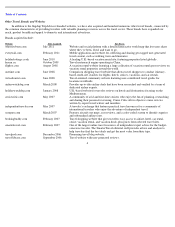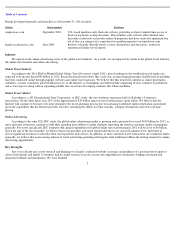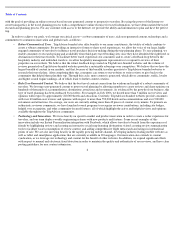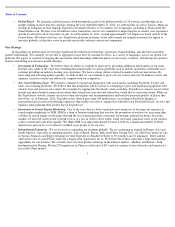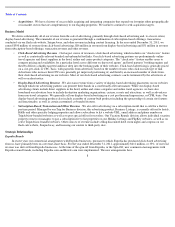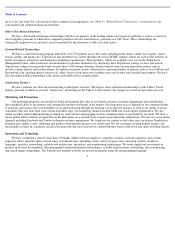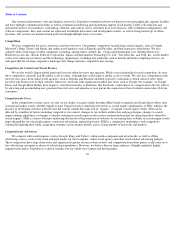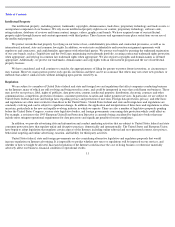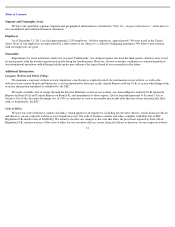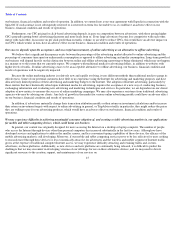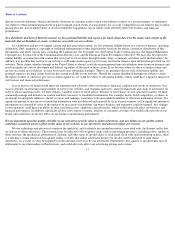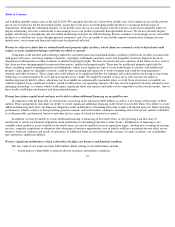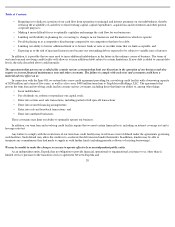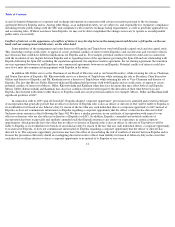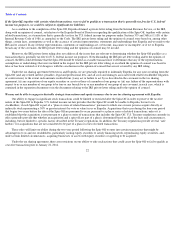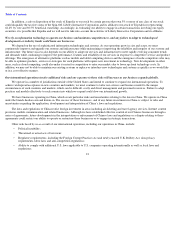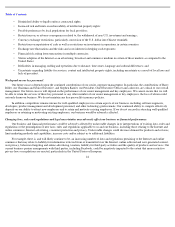TripAdvisor 2011 Annual Report Download - page 18
Download and view the complete annual report
Please find page 18 of the 2011 TripAdvisor annual report below. You can navigate through the pages in the report by either clicking on the pages listed below, or by using the keyword search tool below to find specific information within the annual report.
Table of Contents
providers by offering comprehensive travel planning or shopping capabilities, or refer those leads to suppliers directly, or to other favored
partners, there could be a material adverse impact on our business and financial performance. For example, during 2011, Google completed its
acquisition of flight search technology company ITA Software and separately made changes to its hotel search results, including both expanding
and promoting the use of Google Places. To the extent these actions have a negative effect on our search traffic, our business and financial
performance could be adversely affected.
Declines or disruptions in the travel industry could adversely affect our businesses and financial performance.
Our businesses and financial performance are affected by the health of the worldwide travel industry. Travel expenditures are sensitive to
personal and business discretionary spending levels and tend to decline or grow more slowly during economic downturns. Decreased travel
expenditures could reduce the demand for our services, thereby causing a reduction in revenue.
Most recently, beginning in 2008, domestic and global economic conditions deteriorated rapidly, resulting in increased unemployment and
a reduction in available budgets for both business and leisure travelers, which slowed spending on the services that we provide. Further weakness
in the global economy could create uncertainty for travelers and suppliers, and result in reduced spending by advertisers. These conditions could
have a material adverse impact on our business and financial performance.
We derive substantially all of our revenue from advertising and any significant reduction in spending by advertisers could harm our
business.
Most of our advertisers can generally terminate their contracts with us at any time or on very short notice. Advertisers will not continue to
do business with us if their investment in such advertising does not generate sales leads, customers, bookings, or revenue and profit on a cost-
effective basis, or if we do not deliver advertisements in an appropriate and effective manner. If we are unable to remain competitive and provide
value to our advertisers, they will likely stop placing ads on our websites, which would harm our revenues and business. In addition, we cannot
guarantee that our current advertisers will fulfill their obligations under existing contracts, continue to advertise beyond the terms of existing
contracts or enter into any additional contracts with us.
Expenditures by advertisers also tend to be cyclical, subject to variation based on budgetary constraints, project cancellation or delay, and
to reflect overall economic conditions and buying patterns. If we are unable to generate advertising revenue due to factors outside of our control,
our business and financial performance would be adversely affected.
Click-based advertising accounts for the majority of our advertising revenue. If new, more effective advertising models were to emerge,
there can be no assurance that we will have the ability to offer these models, or offer them in an effective manner. To the extent new technology
platforms, such as mobile and tablet computing, begin to take market share from established platforms, there can be no assurance that our
existing advertising models will operate successfully on these new platforms, or work as effectively as on the desktop computer platform.
We rely on a relatively small number of significant advertisers and any reduction in spending by or loss of those advertisers could seriously
harm our business.
We derive a substantial portion of our revenue from a relatively small number of significant advertisers. If any of our significant
advertisers were to cease or to significantly curtail advertising on our websites, we could experience a rapid decline in our revenue over a
relatively short period of time. For example, for the year ended December 31, 2011, Expedia was our most significant advertising customer in
terms of revenue, and during 2012 and we expect Expedia to lower its CPC pricing by 10% to 15% from 2011 levels, which we expect will have
the effect of reducing Expedia’s aggregate marketing spend with us, which, in turn, could have an adverse effect on
14


